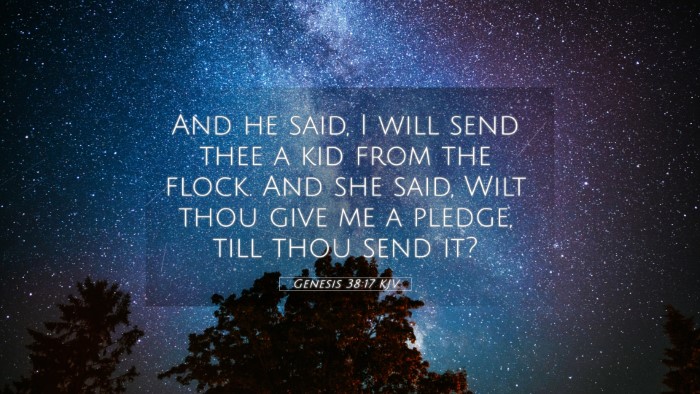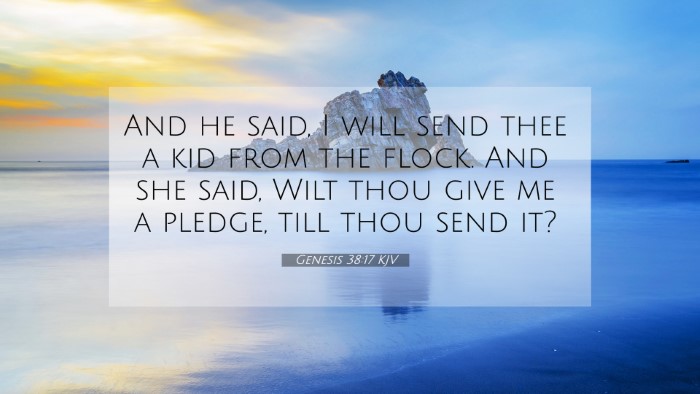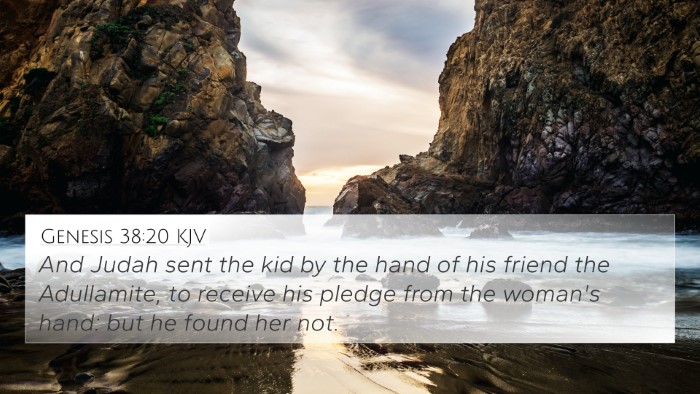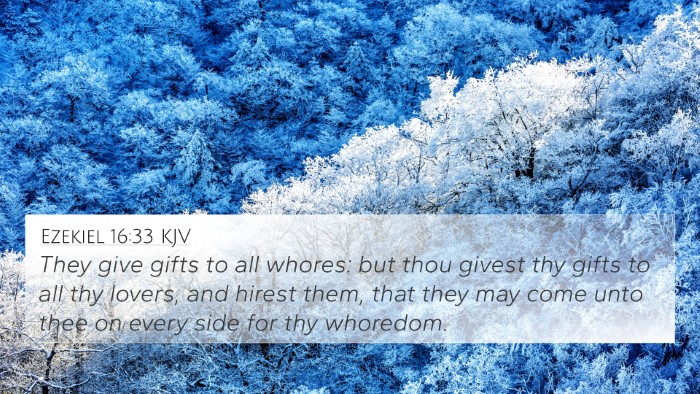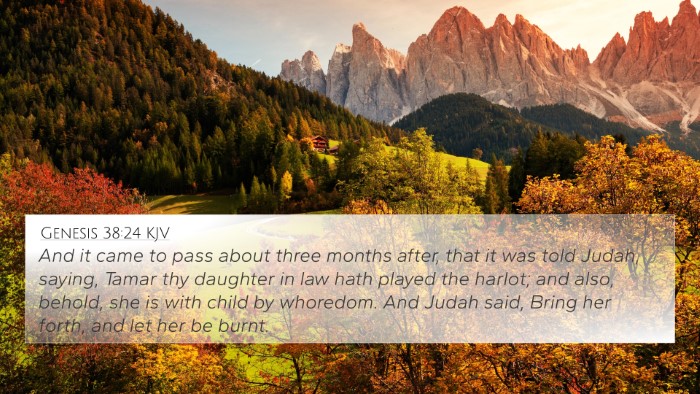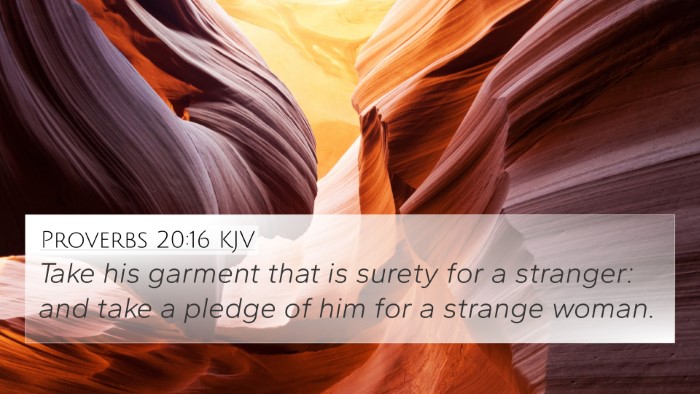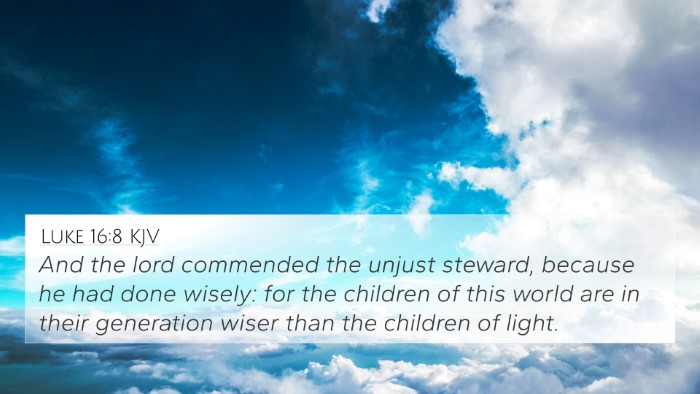Understanding Genesis 38:17
The verse Genesis 38:17 states: "He said, 'I will send you a kid from the flock.' And she said, 'Will you give me a pledge until you send it?'" This moment occurs within the narrative of Judah and Tamar, a story rich with themes of justice, deception, and eventual resolution. The context is significant; it showcases the complexity of human relations and the divine oversight over moral events.
Verse Meaning and Insights
In this verse, we observe the interactions between Judah and Tamar, which highlight a transformative moment in the genealogical lineage of the Israelites. Commentators have drawn various meanings from this text:
-
Judah's Offer:
Judah’s proposal to send a kid from the flock illustrates both his economic status and a cultural practice of payment for services rendered in ancient Near Eastern society. Matthew Henry indicates this as indicative of Judah's intentions which were not fully transparent.
-
Tamar's Request:
Tamar’s request for a pledge until the kid is sent speaks to her keen awareness of the socio-cultural implications of their interaction. It highlights her reasonable caution and concern for security during a time when women often lacked rights and protections.
-
Thematic Significance:
This brief exchange encapsulates deeper themes of negotiation, the seeking of justice, and the intertwining of human decisions with divine plans, as noted by Albert Barnes. Tamar's actions were pivotal in ensuring the continuation of the Messianic line, albeit through morally questionable means.
-
Moral Complexity:
Adam Clarke elaborates on the moral undertones present in this narrative, questioning the righteousness of the characters involved. This story reflects a significant biblical truth: that God's overarching purposes can unfold even through flawed human actions.
Cross References to Genesis 38:17
This verse is interconnected with several other biblical passages that provide insight into its meaning. Here are some key cross-references:
- Genesis 38:11: Judah’s original instructions to Tamar emphasize the social customs regarding levirate marriage, which set the stage for her actions.
- Leviticus 18:15: This law concerning incestuous relationships further frames the moral questions raised by Tamar's actions with Judah.
- Deuteronomy 25:5-10: The law regarding brotherly obligations gives context to the expectations placed upon Judah and Tamar.
- Matthew 1:3: The genealogy of Jesus includes Tamar, highlighting God’s will to include all of humanity in His plan of salvation.
- Hebrews 11:31: This passage references Rahab’s faith, drawing another parallel of how non-Israelites are included in God’s redemptive history.
- 2 Samuel 11:3: David’s encounter with Bathsheba shares themes of moral failing and consequence, similar to those seen in the story of Judah and Tamar.
- Romans 8:28: This verse reminds believers that God works all things together for good, relevant when reflecting on the outcomes of Tamar’s situation.
- Revelation 5:5: The lion of the tribe of Judah signifies the eventual triumph of God's plan through His people, tying back to the character of Judah in Genesis.
Thematic Connections and Comparisons
When conducting a comparative Bible verse analysis, Genesis 38:17 can be linked to various thematic explorations:
-
The Role of Women:
Similarities can be seen with the stories of Ruth and Esther, where women's actions play critical roles in the unfolding of God’s purpose.
-
Divine Oversight in Familial Relationships:
Exploring the Dysfunctional Family Dynamics of Jacob's family in Genesis can provide deeper insights into the recurring themes of reconciliation throughout Scripture.
-
Justice and Restoration:
The narrative eventually leads to themes of justice found in the prophetic books and the New Testament, showcasing God's unwavering commitment to righteousness.
Conclusion
Genesis 38:17 stands as a potent reminder of how God governs human history, ensuring that His promises prevail despite the complexities of human decisions. The interconnected nature of Scripture provides a rich context for understanding this verse, and as believers delve into these connections between Bible verses, they uncover the profound consistency of God's redemptive plan. By utilizing tools for Bible cross-referencing and examining the detailed links between scriptures, one can engage in a deeper understanding of how each part of Scripture informs another, leading to a more comprehensive appreciation of the Bible as a whole.

